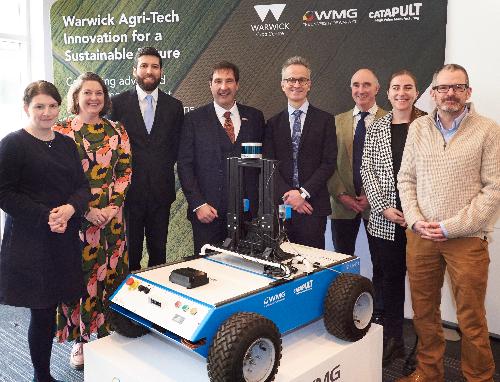Please be advised that we are currently experiencing intermittent issues with our online forms. We are looking into the issue. For anything urgent please contact our customer services team at 01789 267575
Apologies for any inconvenience caused.
News
Published on 21 December 2023
Archived on 21 January 2024

The University of Warwick is shaping the future of farming with automation - addressing issues such as labour shortages, food insecurity and loss of biodiversity.
The new entity, Warwick Agri-Tech, will also support the UK to meet climate targets while enabling the production of enough nutritious food for the growing population. Warwick Agri-Tech will combine two world class faculties at WMG at The University of Warwick and the School of Life Sciences (SLS) to spearhead automation in areas such as horticulture, crops and forestry.
Robots will be a key tool for farmers and industry leaders under increasing pressure. There is a constant demand to grow enough high quality, nutritious food to feed an expanding human population, and to do so in a way that won't harm the planet and meet the targets of climate change.
According to scientists, the UK will need to produce 50% more food by 2050, while reducing land consumption by 50%. This is further challenged by labour shortages, a broken food system and the fact we are overusing the Earth's biocapacity (the capability of ecosystems to produce useful biological materials and to absorb waste).
The University of Warwick is in a unique position to tackle these issues and develop farming technology, with expertise in both automation and life science.
Warwick Agri-Tech was born out of an initial project which developed a crop monitoring robot (Crombot) to autonomously move up and down glasshouses and check fruit for ripeness. Officially launching today, with a visit from the Department for Environment, Food & Rural Affairs (DEFRA), Warwick Agri-Tech will continue its research on several key projects:
The University's leading crop research centre at based at the Innovation Campus, Stratford-upon-Avon is a leading, 200-hectare agricultural environment to conduct the research. Scientists at the University will collaborate directly with industry partners and the Government to drive and implement the new technology in the farming sector.
Cllr George Cowcher, Planning and Economic Development Portfolio at Stratford-on-Avon District Council said: "This is precisely the technology driven type of investment we are looking to attract into Stratford-on-Avon District. Agriculture is a key industry in the District and this focus on the future is highly welcome."
Professor David Greenwood, Director for Industrial Engagement, and CEO of the High Value Manufacturing Catapult at WMG, said: "The emerging needs of the agriculture sector have provided a perfect opportunity for The University of Warwick to bring together our expertise in manufacturing automation with our expertise in life sciences, so we can simultaneously develop robots suitable for use in greenhouses and fields, and ways of growing crops which take advantage of the opportunities of automation. As the UK struggles with availability of agricultural labour, and high food prices, this promises to unlock nutritious and affordable food for all."
Professor Miriam Gifford, School of Life Sciences, University of Warwick, said: "Warwick Agri-Tech will benefit from the entrepreneurship of WMG and the history of excellence in agricultural innovation from the School of Life Sciences' Warwick Crop Centre, plus the combined stakeholder groups to inform and enable outputs. The fresh food industries need automation urgently. Warwick Agri-Tech will grow rapidly into research and innovation space screaming for workable solutions and expecting substantial funding initiatives."
More information about Warwick Agri-Tech here
Stratford-on-Avon District Council
Elizabeth House, Church Street,
Stratford-upon-Avon, Warwickshire,
CV37 6HX
Tel: 01789 267575
Is this information helpful?